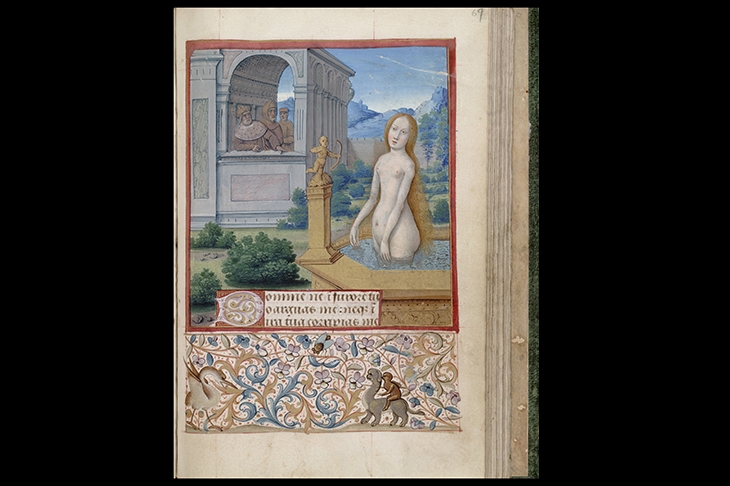The novel is a wonderfully commodious creature. One might wish they made trousers like it, for it can stretch or shrink to accommodate almost anything, from Ali Smith’s Spring (part story, part polemic) to Max Porter’s prose-poem/fable, Lanny. Then there’s the current vogue for re-tellings: Margaret Atwood’s version of The Tempest and Pat Barker’s feminist look at the Iliad. Penguin even has a ‘Modern Retellings Book List’, which includes Alexander McCall Smith’s reworking of Emma. (Why would you?)
Elizabeth Cook was ahead of the game with her Achilles in 2001. Her latest book, Lux, four times as long, having been ‘slow in the making’, is a kind of meditative triptych (‘Ark’, ‘Prophet’, ‘Poet’) rooted in the tale of David and Bathsheba. The story has everything a novelist could wish for in its themes of power, lust, love, faith and conscience.
‘Ark’ introduces us to the children’s David, the shepherd boy who kills the giant Goliath with a single stone from his sling. Then he becomes king, lusts after Bathsheba (who in turn becomes pregnant) and very nastily arranges for her husband to be killed by sending him back to the war.
In ‘Prophet’, David is brought to recognise the abuse of power that has led him to sin against Yahweh. The prophet Nathan foretells that Bathsheba’s child will die as a result of David’s dishonouring of Yahweh. As penance, David spends seven days fasting and meditating and emerges wiser, kinder and with psalms to sing.
Primarily a poet, Cook writes with impressive empathy for David. There is both a painterly eye and a physicality about her prose. Michael Symmons Roberts’s endorsement of Lux rightly focuses on its ‘striking portrayal of religious belief under pressure’.
The third part leaps forward to the spring of 1528 and to the poet Thomas Wyatt. Henry VIII’s desire for Anne Boleyn can be compared to David’s for Bathsheba. Henry acquires rich Flemish tapestries depicting the early lovers, and arranges a dramatic pageant to exhibit them, witnessed by Wyatt. The poet is familiar with the story and the psalms, and David’s seven songs of penitence have ‘long inhabited him’. He has time while in the Tower to remember and ‘English’ them — making them, one critic has said, penitential in matter and a penance for the reader. The connection between David and Wyatt seems to me a bit precarious (Cook did the same with Achilles, linking him to Keats). Wyatt’s falcon is depicted on the cover, symbolising both freedom and light.
Lux
Author: Elizabeth Cook
Publisher: Scribe
Page count: 403
Price: £16.99





Comments